32 Easy Perennials for Shade That Will Bloom All Summer Long
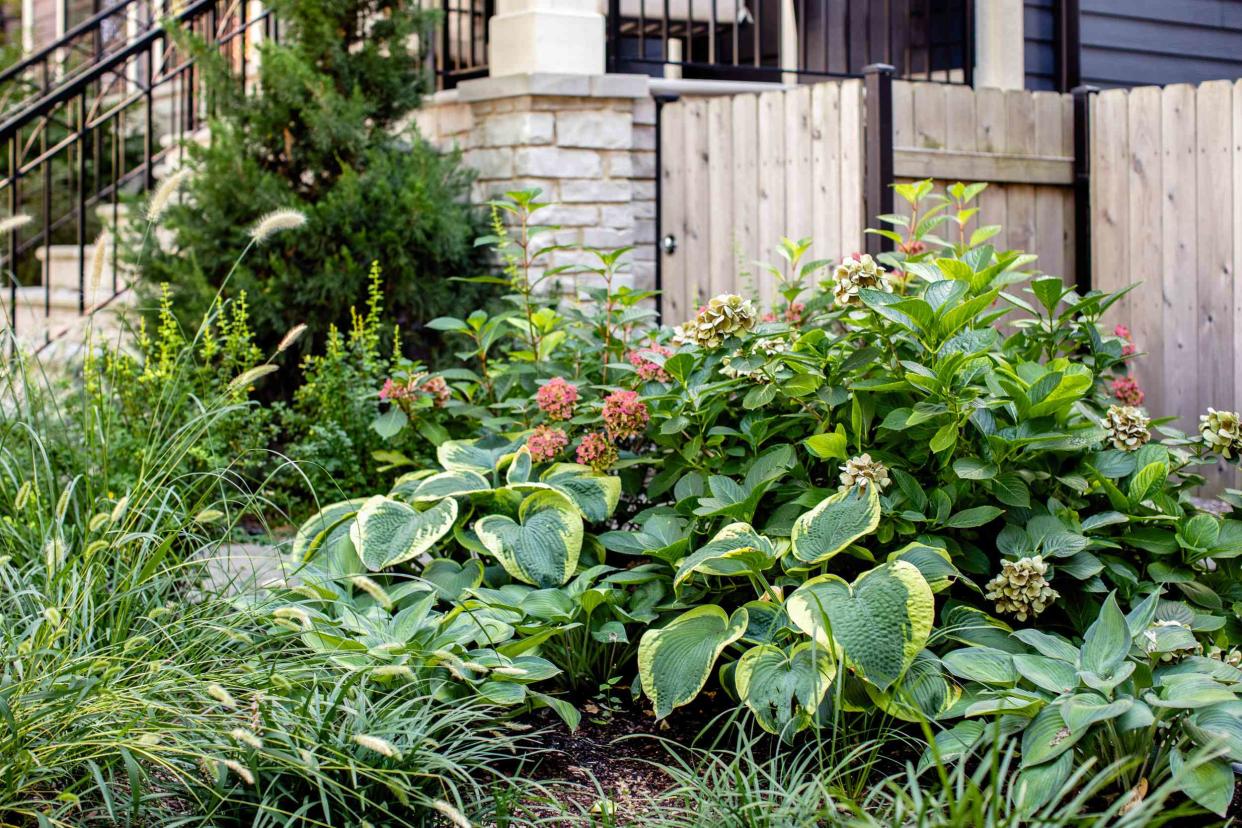
The Spruce / Sarah Crowley
Perennials that thrive in the shade and bloom all summer long are the ultimate gifts from nature. They keep on giving month after month and year after year.
Filling your garden with these varieties will add color to your yard in spite of a heat wave. Plus, they are also great for breathing life into those dark corners of your lawn where other blooming plants won't thrive.
Without further ado, here are 32 shade-loving perennials to consider adding to your collection this year.
Want more gardening tips? Sign up for our free gardening newsletter for our best-growing tips, troubleshooting hacks, and more!
Astilbe
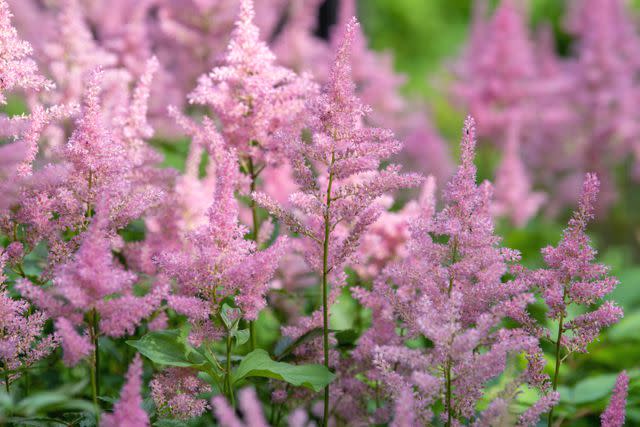
The Spruce / Evgeniya Vlasova
Astilbe produces feather-like blooms that adorn the plant from late spring into late summer. This annual is relatively low maintenance, and also deer resistant. You can plant it in full shade, but it prefers partial shade.
To keep this hardy plant safe through the winter, simply place 2 inches of mulch around the stem after the first frost. Astilbe is a slow-growing plant, which means it will bloom for several years before dividing it.
Growing Conditions: Partial sun or shade, moist, acidic or neutral soil
USDA Hardiness Zones: 3-8
Full Size: 6-24 in. tall, 6-60 in. wide
Hosta
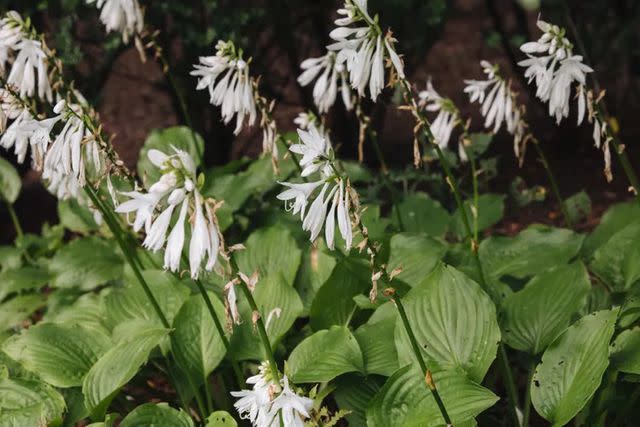
The Spruce / LetÃcia Almeida
Hostas thrive in the shade, and their pastel-hued blooms add a pop of light to dark corners. They can bloom for up to a month in the summer. However, its large leaves still provide beauty long after the flowers wither away. Simply trim the old stalks when the flowers are done blooming.
When planting hostas, be sure to use well-drained potting soil, especially if you live in a region with dense clay-like soil. Hostas take their time to grow and reach full maturity within about four years.
Growing Conditions: Full or partial shade, well-drained and acidic soil
USDA Hardiness Zones: 3-9
Full Size: 6–48 in. tall, 10–60 in. wide
Hellebore
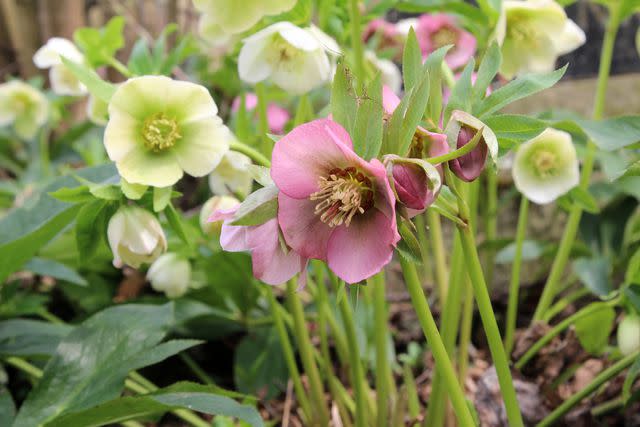
Wirestock / Getty Images
While hellebore primarily blooms from fall to early spring, this plant's evergreen foliage still provides color and life to a garden in the summer. This sprawling plant grows slowly, reaching maturity within about three years.
Hellebores enjoy partial to full sun in the summer, but they do need more sunlight in the winter to thrive.
Growing Conditions: Shade in summer and sun in winter, moist, well-drained soil that is neutral or alkaline
USDA Hardiness Zones: 3-9
Full Size: 1–2 ft. tall, 1–2 ft. wide
Begonia
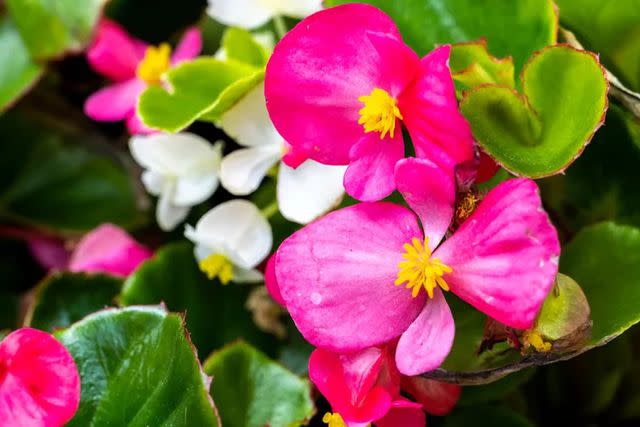
The Spruce / Jayme Burrows
When a begonia starts flowering in the summer, you can expect to see its blooms until the first frost. This plant prefers partial shade, as too much sun can fade the color of the delicate blooms.
Begonias do not spread quickly, but the growth rate and size depend on the variety. You'll find them in a variety of colors, including pink, white, red, and orange.
Growing Conditions: Partial sun to shade, moist and slightly acidic soil
USDA Hardiness Zones: 9-10
Full Size: 6-12 in. tall, 6-18 in wide
Coral Bells (Heuchera)
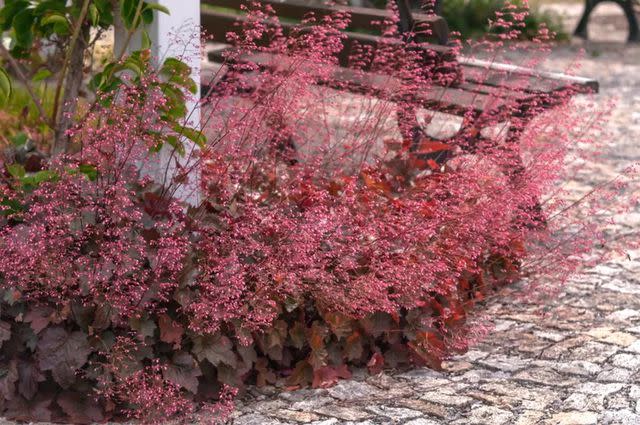
The Spruce / Evgeniya Vlasova
Coral bells are notorious for their colorful foliage and wispy blooms, which appear around mid-summer. The plant then keeps on blooming for about two months after.
This perennial is fast growing, so it does require dividing about once every three years.
While coral bells do thrive in the shade, they do best if they receive partial sun as well. You don't need to do much maintenance for coral bells, but deadheading the plant will ensure blooms all summer long.
Growing Conditions: Partial shade, well-drained and slightly acidic soil
USDA Hardiness Zones: 4-9
Full Size: 8–18 in. tall, 12–24 in. wide
Bleeding Heart
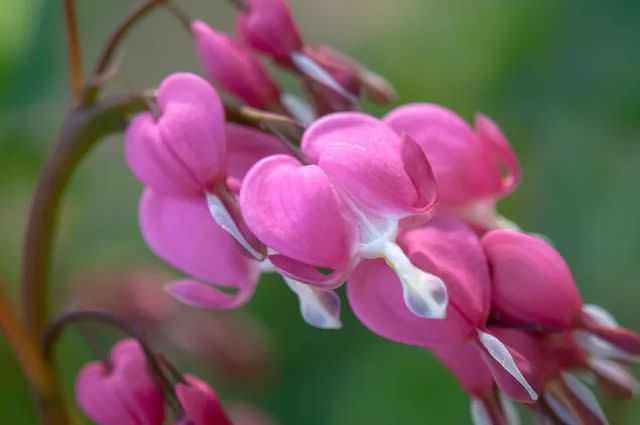
The Spruce / Evgeniya Vlasova
The bleeding heart plant produces heart-shaped blooms that grow from an arched stem, making it a beautiful and whimsical garden addition.
This plant starts flowering in late spring and well into summer, giving you up to six weeks of bloom time. It grows at a steady rate and requires very little maintenance.
Try to plant bleeding hearts in an area with some wind break, as heavy winds can damage the delicate vines.
Growing Conditions: Partial shade, moist, well-drained soil that is acidic or neutral
USDA Hardiness Zones: 3-9
Full Size: 1–3 ft. tall, 2–3 ft. wide
Lungwort
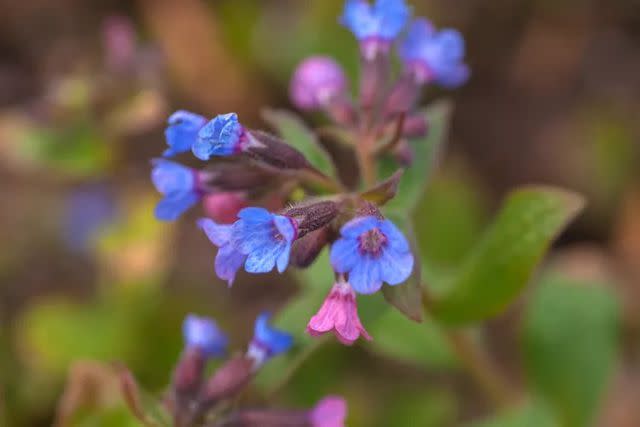
The Spruce / Evgeniya Vlasova
Lungwort shows off blue or pink blooms, and sometimes both at once. This is due to the soil's shifting acidity level during its long bloom season, which begins in the spring and runs for about four weeks.
This plant can spread rapidly, so make sure to divide it in the spring or fall. Lungwort likes its soil just right, so avoid letting it get too dry or wet.
Growing Conditions: Partial shade or full shade, Moist, well-drained soil that is neutral or alkaline
USDA Hardiness Zones: 3-8
Full Size: 6–12 in. tall, 12–18 in. wide
Foxglove
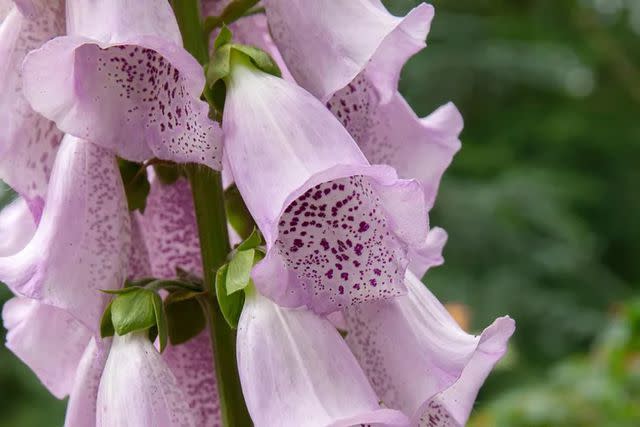
The Spruce / Evgeniya Vlasova
The foxglove plant is a show stopper, with its tall, dramatic blooms in various shades of pink and purple. Foxglove starts blooming in early summer and continues for two to three months. You can plant foxglove in partial sun, but it will need some sun to yield a healthy amount of blooms.
Growing Conditions: Full or partial sun, well-drained and slightly acidic soil
USDA Hardiness Zones: 4-10
Full Size: 2-5 ft. tall, 1-2 ft. wide
Hydrangea
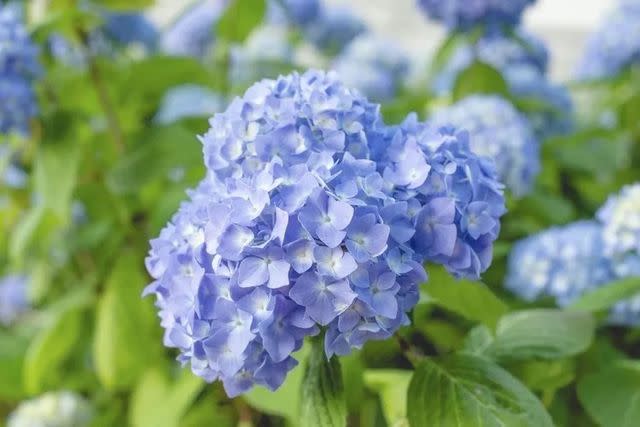
The Spruce / Claire Cohen Bates
With their large, fluffy cluster of blooms, hydrangeas are plants that steal attention all summer long. They begin blooming in early spring and keep producing new flowers until fall.
You can also leave the dried blooms on the plant to add some interest to your lawn during the winter. These rapid-growing plants increase by about two feet in size each year.
Growing Conditions: Full or partial sun, well-drained and moist soil that is acidic, neutral, or alkaline
USDA Hardiness Zones: 5-9
Full Size: 2-20 ft. tall, 2-6 ft. wide
Rodgers Flower (Rodgersia pinnata)

The Spruce / Evgeniya Vlasova
The Rodgers flower plant gets its name from the stunningly large plumes that reach about three feet high. The blooms make their appearance in June and continue into July. This plant is best for areas that receive at least partial sun. They grow fastest in soil that's moist but also well-drained.
Growing Conditions: Full sun to partial shade, rich, well-drained and alkaline soil
USDA Hardiness Zones: 5-7
Full Size: 3 ft. tall, 5 ft. wide
Flowering Ginger (Hedychium)
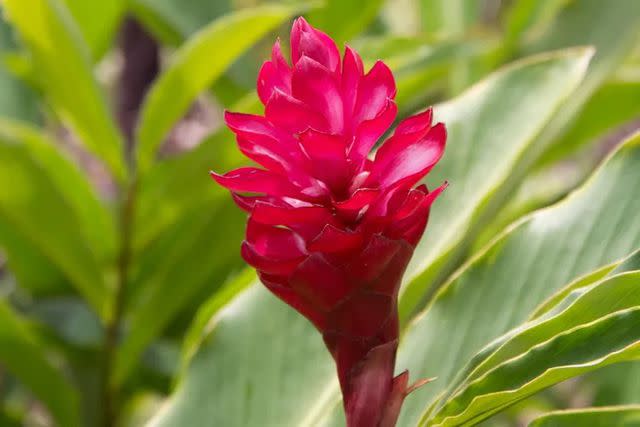
The Spruce / Heidi Kolsky
There are countless varieties of flowering ginger, and each one possesses a dramatically unique look. You'll find them in shades of pink, purple, white, and brown.
Depending on which one you plant, it will start blooming in late spring or summer and give off color into the fall. You'll want to water your flowering ginger more during its growing season than dormant season.
Growing Conditions: Partial shade, moist and well-drained soil that is neutral or acidic
USDA Hardiness Zones: 7-10
Full Size: 4-5 ft. tall, 1-2 ft. wide
Daylily
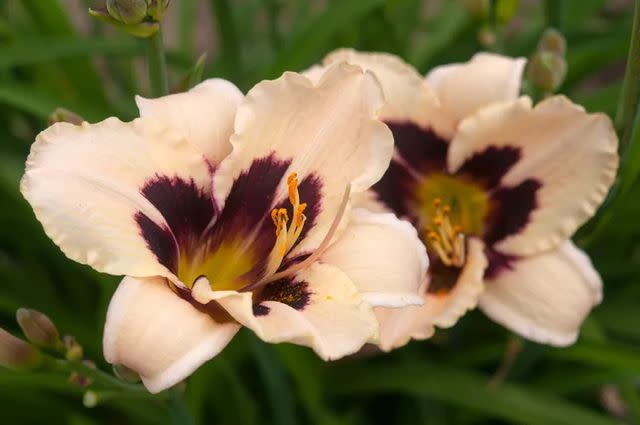
The Spruce / Evgeniya Vlasova
Daylilies are another plant that comes in countless varieties. While most daylilies do prefer full sun, some prefer afternoon shade in hotter climates.
They bloom in June or July and continue showing off for up to four to five weeks. You only need to water these low-maintenance plants when the weather is extra dry.
Growing Conditions: Partial shade to full sun, loamy and acidic soil
USDA Hardiness Zones: 3-10
Full Size: 6 in. to 5 ft. tall, 2-4 ft. wide
Yellow Corydalis
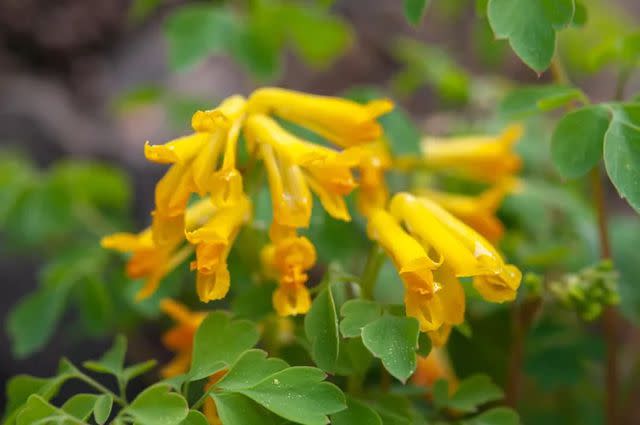
Yellow Corydalis
Yellow Corydalis's foliage is fern-like, so it looks beautiful even when it's not in bloom. However, the blooms themselves last long, with a May to September bloom period.
This plant absolutely thrives in the shade and can even handle full shade. Plus, it's also deer-resistant.
Growing Conditions: Part to full shade, well-drained, slightly alkaline soil
USDA Hardiness Zones: 5-7
Full Size: 9-15 in. tall and 12-18 in. wide
Dead Nettle
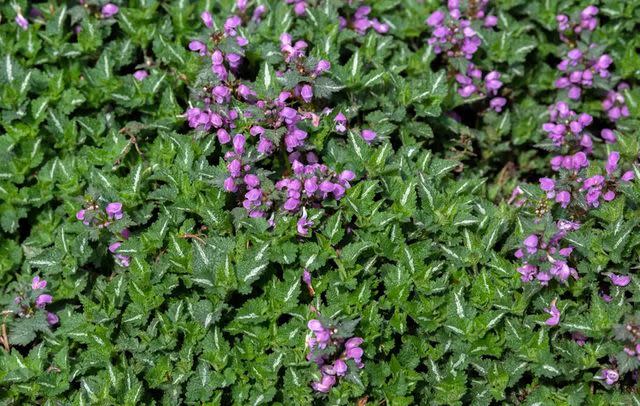
The Spruce / Evgeniya Vlasova
This sprawling, low-level plant loves shady and moist woodland areas, so it's great for planting near your trees. It blooms from late spring to early summer and shows off beautiful purple, pink, or white blooms and silvery green leaves.
Dead Nettle is also pretty low maintenance, especially if you plant it in full shade. You'll want to water it more often if it is in only partial shade.
Growing Conditions: Part to full shade, loamy and acidic soil
USDA Hardiness Zones: 4-8
Full Size: 6-9 in. tall, 12-24 in. wide
Turtlehead
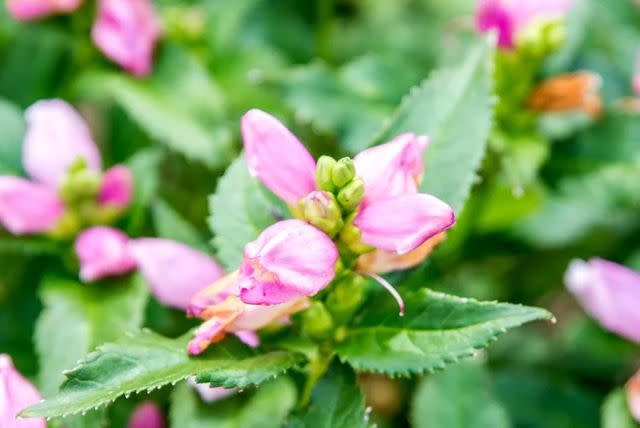
The Spruce / Adrienne Legault
This plant gets its name from the unique shape of its blooms. Turtlehead is a late bloomer and doesn't start showing off until August. However, the blooms last well into fall and for up to six weeks.
Although it thrives in full sun, it can make due in partial shade. You can encourage your turtlehead to produce even more blooms by pinching off the tips of each shoot.
Growing Conditions: Full sun to partial shade, rich, moist, and neutral or acidic soil
USDA Hardiness Zones: 3-9
Full Size: 2–3 ft. tall, 1–2 ft. wide
Aster

The Spruce / Adrienne Legault
Asters aren't just for fall displays. If you plant them in the ground, they will come back each year and produce blooms from August to October.
You can plant your aster in an area that receives just partial sun, although you might see more blooms if you plant it in full sun. When not restricted to a container, aster can slowly grow to reach a maturity of up to six feet tall and four feet wide.
Growing Conditions: Full sun to partial shade, loamy and well-drained soil that is neutral or acidic
USDA Hardiness Zones: 3-8
Full Size: 1–6 ft. tall, 1–4 ft. wide
Lady's Mantle
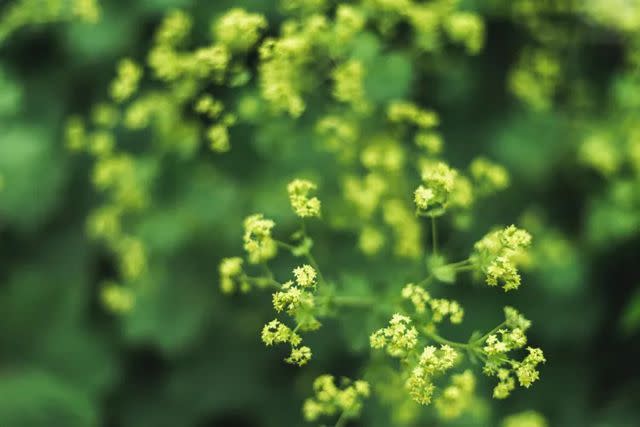
The Spruce / Autumn Wood
From its scalloped leaves to its delicate blooming clusters, the lady's mantle plant makes a unique addition to any flowerbed. This plant self-seeds and can become invasive, so you'll need to take steps to keep it contained.
You'll need to deadhead the plant as soon as the flowers start to wilt to prevent it from growing out of control. It blooms from late spring to early summer, and it does well in partial shade.
Growing Conditions: Full sun to partial shade, well-drained soil that is neutral or acidic
USDA Hardiness Zones: 3-8
Full Size: 12–24 in. tall and wide
St. John's Wort
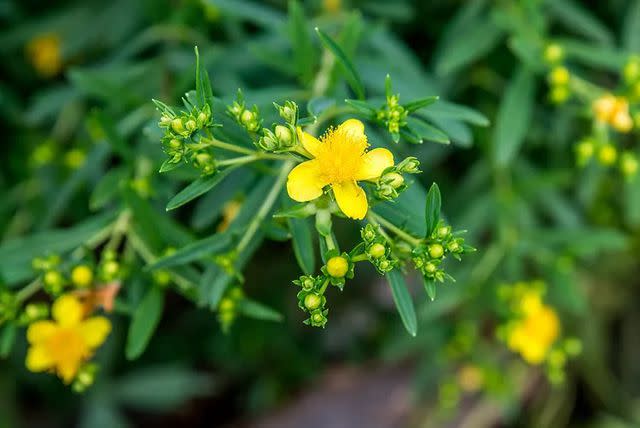
The Spruce / Adrienne Legault
St. John's Wort puts on a show starting in June that lasts into September. Some varieties also sport beautiful red berries next to the blooms. It does well in partial shade because too much sun can cause it to wilt.
Growing Conditions: Full sun to partial shade, well-drained soil that is acidic, neutral, or alkaline
USDA Hardiness Zones: 3-8
Full Size: 1-3 ft tall and not quite as wide
Drumstick Allium
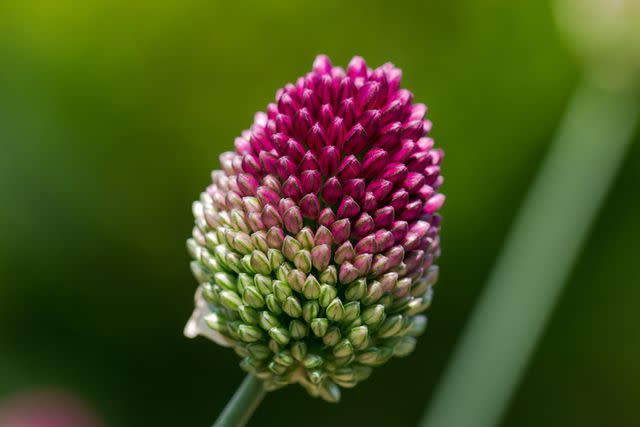
Tim Mason / Getty Images
Drumstick Allium is a type of ornamental onion. This plant is a heavy bloomer and shows off its buds of color from mid-summer until the season's end. This plant does prefer full sun, but it can tolerate some partial shade as well. This bulbous herb is easy to grow and also deer-resistant.
Growing Conditions: Full sun to partial shade, well-drained loamy soil that is acidic, neutral, or alkaline
USDA Hardiness Zones: 3-8
Full Size: 1-3 ft tall and not quite as wide
Bigroot Geranium
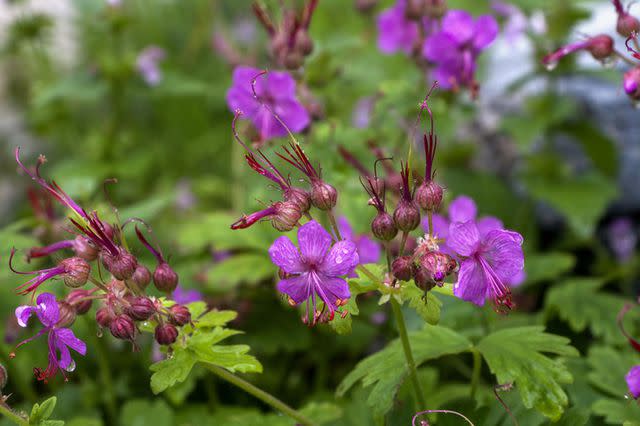
Nadezhda Tonkova / Getty Images
Many types of geraniums are one-and-done annuals, but big root geranium is actually a perennial. It can thrive in either full sun or partial shade.
Depending on where you live, big root geranium may even prefer more shade if the summers are hot. The gorgeous purple blooms keep going from April to July.
Growing Conditions: Full sun to partial shade, sandy soil that is lightly acidic
USDA Hardiness Zones: 4-8
Full Size: 1-3 ft. tall and wide
Toad Lily
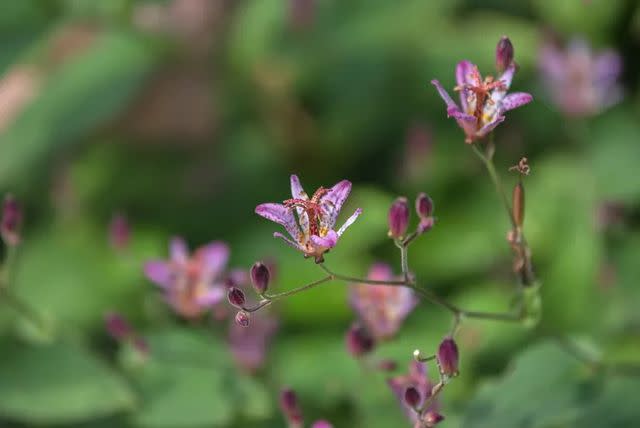
The Spruce / Evgeniya Vlasova
Toad lilies show off white or light purple petaled flowers that almost look like mini orchids. They are a great choice for shade gardens because they don't need very much light to produce a hefty amount of blooms. The flowers cluster at the very end of the stalk and start emerging in late summer before diminishing in early fall.
Growing Conditions: Partial sun to full shade, loamy, moist, well-drained soil that is acidic or neutral
USDA Hardiness Zones: 4-8
Full Size: 2-3 ft. tall, 1-2 ft. wide
Golden Star
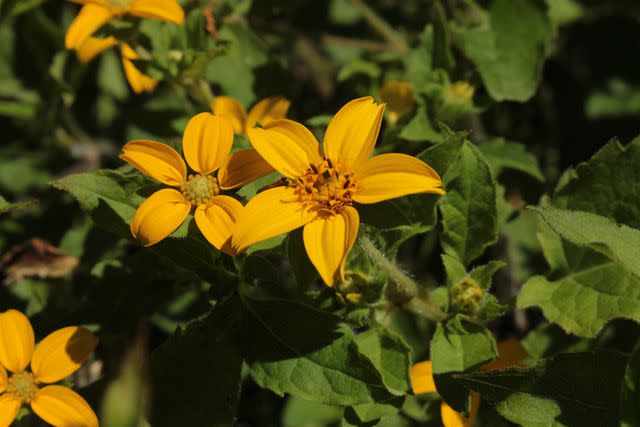
RukiMedia / Getty Images
The golden star plant is a pretty fuss-free plant that can adapt to pretty much any light situation. It especially loves dappled light, which makes it great for planting near a tree.
If you choose to add this plant to your shade garden, it will grace you with its yellow blooms from May through October.
Growing Conditions: Full sun to partial shade, loamy and slightly acidic soil
USDA Hardiness Zones: 4-8
Full Size: 3-12 in. tall, 12-48 in. wide
Cardinal Flower
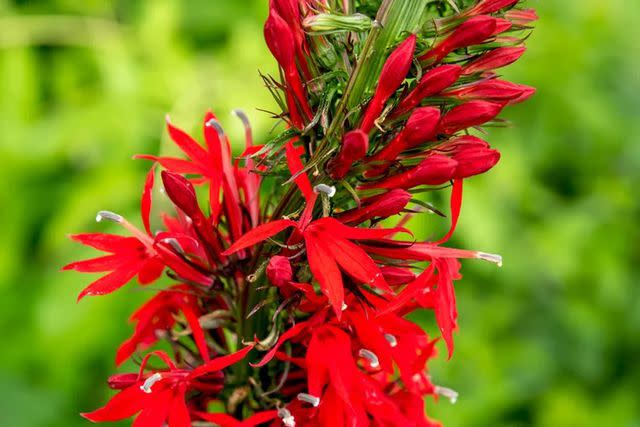
The Spruce / Adrienne Legault
If you want to add a cheery pop of red to a section of your yard that only receives partial light, the cardinal flower plant is a wonderful option. It blooms at the height of summer in July and the color sticks around into September. You can prolong the life of this perennial by dividing it every other year.
Growing Conditions: Full sun to partial shade, moist and slightly acidic or neutral soil
USDA Hardiness Zones: 2-9
Full Size: 3-4 ft. tall; 1-2 ft. wide
Carpathian Bellflower
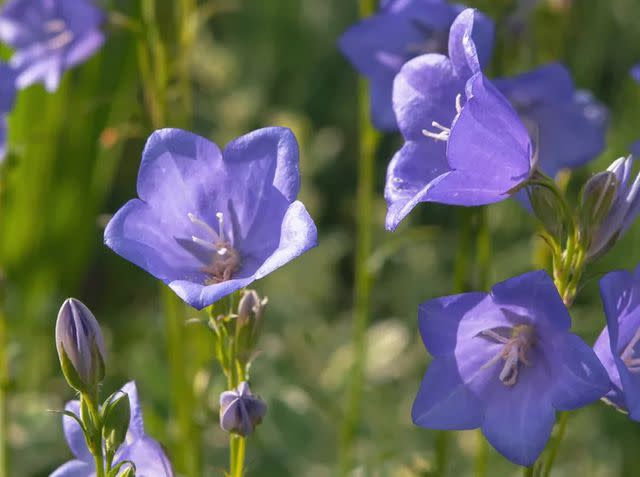
The Spruce / Evgeniya Vlasova
Bellflower can grow as a perennial, biennial, or annual, depending on your growing zone. You can add a little variety to your shade garden by mixing blue, purple, and white varieties. It truly blooms all summer long, with the first buds appearing in June to the last in August.
Growing Conditions: Full sun to partial shade, loamy and sandy soil that is neutral or alkaline
USDA Hardiness Zones: 3-8
Full Size: 3 in. to 6 ft tall, 6-36 inches wide
Hardy Geranium (Cranesbill Geranium)
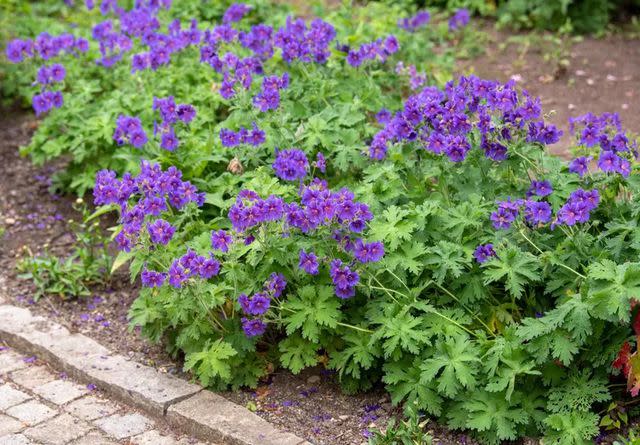
The Spruce / Evgeniya Vlasova
One way to give your garden a flair of blue, pink, purple, and white is via hardy geranium. Unlike other geraniums that are annuals, this one will come back year after year with a little TLC.
Be sure not to plant them too deep, which can prevent flowering. Planting hardy geranium in partial shade will help the plant go longer between waterings. This plant shows off its blooms from early summer to early fall.
Growing Conditions: Full sun to partial shade, well-drained and slightly acidic soil
USDA Hardiness Zones: 3-9
Full Size: 6–36 in. tall, 1–3 ft. wide
Heucherella
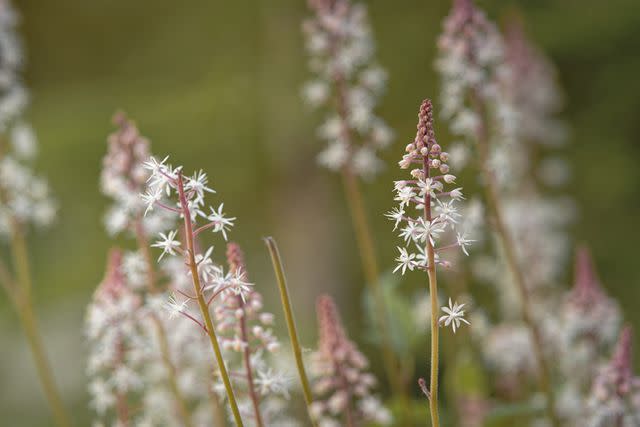
Wirestock / Getty Images
Heucherellas are a cross between tiarellas and heucheras, and they possess some of the best qualities of both. The foamy bell heucherella variety shows off lovely pale pink blooms from early to mid-summer.
Growing Conditions: Full sun to partial shade, medium moisture soil that is neutral to slightly acidic
USDA Hardiness Zones: 4-9
Full Size: 20 in. tall, 28 in. wide
Spiderwort
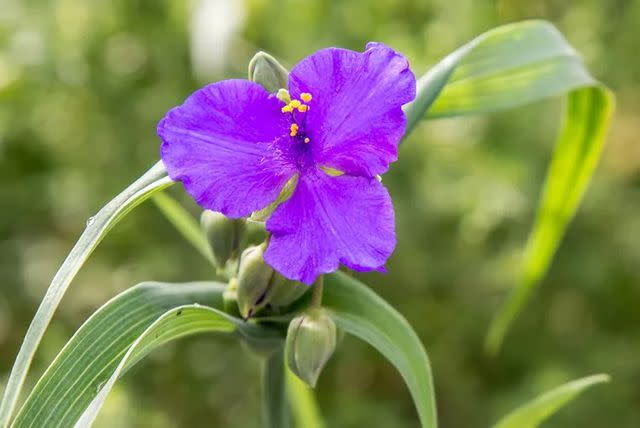
The Spruce / Adrienne Legault
This is one highly adaptable plant that can thrive in whatever light conditions you throw its way. Spiderwort blooms beginning in late spring and its color sticks around into early summer. Its leaves grow fast each season and reach up to three feet at its peak. Spiderwort is a great option if you want to attract pollinators to your yard.
Growing Conditions: Full sun to partial or full shade, moist but well-drained and acidic soil
USDA Hardiness Zones: 4-12
Full Size: 1 ft.–3 ft. tall, 1–1.5 ft. wide
Actaea
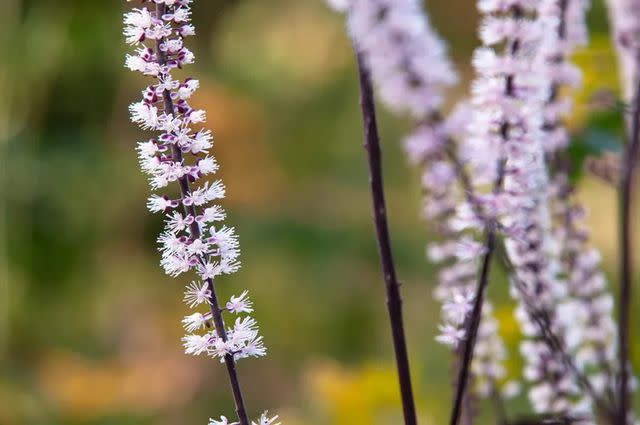
The Spruce / Evgeniya Vlasova
At 3 feet tall, Actaea is already a pretty sizable plant. But when it blooms, its flowers rise to 7 feet tall.
The show-stopping blooms on black vines start taking off in late summer and last until the fall. Unlike other blooming plants, Actaea actually produces more flowers in the shade than sun.
Growing Conditions: Partial to full shade, well-drained and neutral soil
USDA Hardiness Zones: 4-8
Full Size: 2-4 ft. tall (7 ft. tall with flowers)
Fuchsia
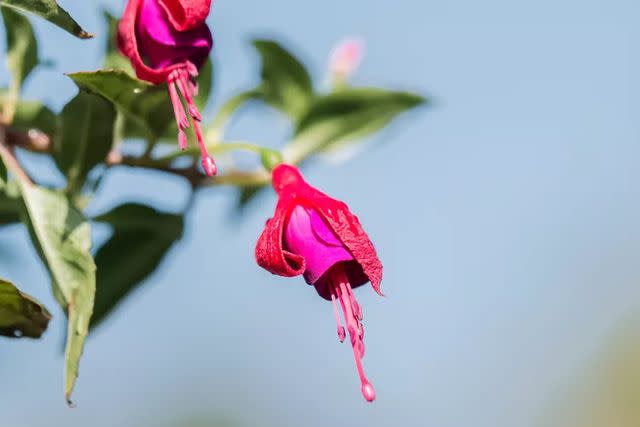
The Spruce / Kara Riley
Named after its vibrant hue, fuchsia gives the gift of its gorgeous blooms starting in the spring and ending in the fall. Although the plant prefers partial shade, it can still thrive in full shade. Fuchsia does especially well in humid environments.
Growing Conditions: Partial shade, moist but well-drained soil that is neutral to acidic
USDA Hardiness Zones: 10-11
Full Size: 1 to 2 ft. tall, with a similar spread
Giant Himalayan Lily
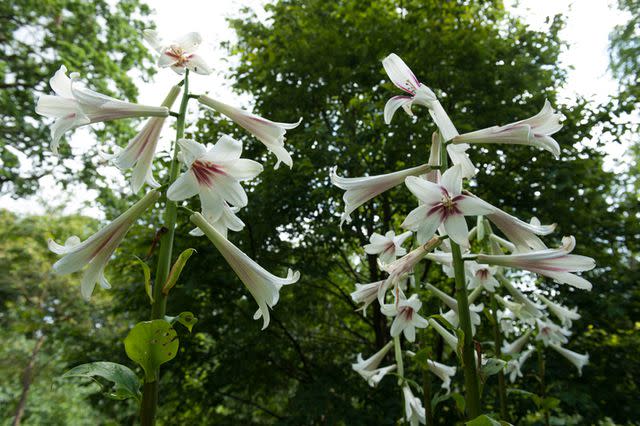
pcturner71 / Getty Images
Another fittingly named plant, the giant Himalayan lily can grow tall enough to tower over most humans. They grow slowly but steadily, and can take three to five years to reach the height needed to flower. But when the time comes, it will surprise you with blooms between June and August.
Growing Conditions: Partial shade, moist and alkaline or neutral soil
USDA Hardiness Zones: 7-9
Full Size: 7-9 ft. tall, 2-3 ft. wide
Sweet Alyssum
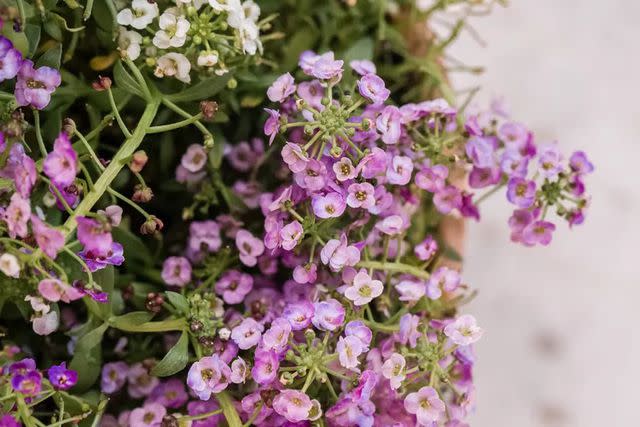
The Spruce / Kara Riley
Sweet alyssum starts blooming in the early spring and fades a bit into the summer. However, it gets a second bloom time in the fall. You can plant sweet alyssum under taller plants, and it will act as a living mulch to help keep the soil moist. This flowering plant appreciates morning sun and afternoon shade.
Growing Conditions: Full sun to partial shade, moist but well-drained soil that is neutral to acidic
USDA Hardiness Zones: 5-9
Full Size: 3–10 in. tall, 2–4 in. wide
Tiarella (Foam Flower)
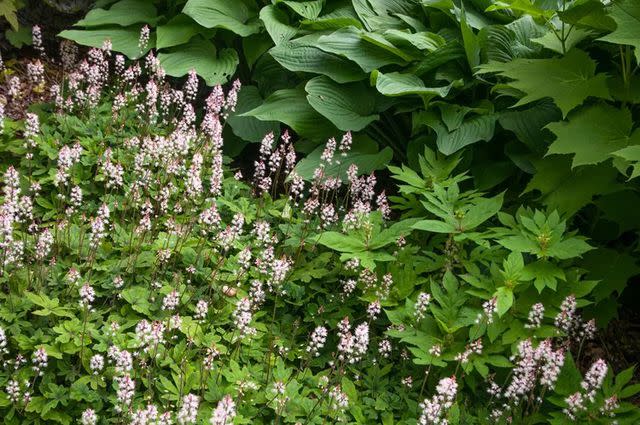
The Spruce / Evgeniya Vlasova
Tiarella is a native perennial wildflower that loves woodland conditions, which means it also loves shade. In fact, you'll often find it growing under trees. It starts blooming in the spring and lasts for about six weeks, so it's great if you want to add some color to your garden in the early cusp of summer.
Growing Conditions: Full or partial shade, loamy soil that is neutral to acidic
USDA Hardiness Zones: 3-8
Full Size: 1-3 ft. tall, 6-12 in. wide
Read Next: 30 Best Perennial Flowers for a Shade Garden
Read the original article on The Spruce.

